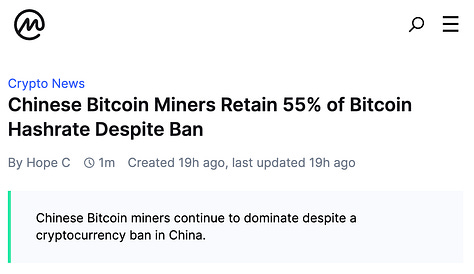Is China Really Dominating Bitcoin Mining... Again?
Recent news reports don't provide an accurate picture

Over the past week, there has been a slew of media coverage about China’s alleged bitcoin mining dominance all of a sudden despite the country’s mining ban, all derived from a social media post that was somewhat misleading, if not entirely inaccurate.
It all boils down to a persistent misunderstanding about the roles of bitcoin mining pools and mine operators. You can check out the headlines first.






The source of all the mentions about China regaining hashrate dominance comes from a post on X by Ki Young Ju, founder, and CEO of CryptoQuant. The post cited data showing that Chinese bitcoin mining pools operate 55% of the network, while U.S. pools manage 40%. While the data is approximately correct, its binary interpretation has likely led to misinformation.
Ju added in his post that, “U.S. pools primarily cater to institutional miners in America, while Chinese pools support smaller miners in Asia,” leading to the conclusion that “bitcoin hashrate dominance is shifting to U.S. mining companies.”
However, this interpretation misses some nuances. A bitcoin mining pool—a virtual cloud service—aggregates the compute power (aka hashrate) of individual bitcoin mines at various locations, not just within the country where the mining pool’s team is mainly located.
For sure, Foundry USA Pool specifically caters to institutional operations based in the U.S., so you can expect the hashrate connected to Foundry USA Pool to all come from within the U.S. Same with MARA Pool, the solo mining pool of U.S. mining giant Marathon Digital. But you can still operate a bitcoin mine in the U.S. and connect its hashrate to Antpool or f2pool.
The point is, major Chinese pools like Antpool, F2pool, ViaBTC, BTC.com, and Binance Pool aggregate hashrate from mines across the globe, including those in the U.S. It’s crucial to note that we lack insight into the exact geographic breakdown of their hashrate, making assumptions about how much of their power originates from China unreliable.
Take BitFuFu, Bitmain’s mining proxy, which alone operates nearly 30 EH/s of hashrate. It most likely connects to Antpool given Bitmain’s ownership of Antpool, so that is nearly 20% of Antpool’s hashrate already. Per BitFuFu’s annual reports, the hashrate under its management is spread across the world with a major presence in the U.S. so its hashrate is neither “relatively small” nor based in Asia.
It is undeniable that the hashrate in the U.S. has been growing significantly since China’s mining ban so much so that it is not even news that the U.S. holds the crown now.
According to data from TheMinerMag, Foundry USA Pool and MARA Pool mined 18% of all bitcoin blocks in January 2022. As of August 2024, that figure has risen to 33.6%, and that doesn’t include U.S.-based hashrate connected to Chinese pools.
Hardware and Infrastructure News
Dormant Bitcoin Addresses Move 250 BTC Mined in January 2009 - TheMinerMag
IREN Surpasses 20 EH/s in Bitcoin Mining Hashrate Race - TheMinerMag
Revolve Labs Withdraws Bitcoin Mining Proposal After Minnesota Residents’ Outcry - TheMinerMag
Corporate News
Rhodium Seeks Court Order for Bitcoin Mining Sales in Chapter 11 - TheMinerMag
Riot, Bitfarms Reach Settlement in Hostile Bitcoin Mining Takeover Bid - TheMinerMag
Bitfarms Co-Founder Sells Shares After Stepping Down from Board - TheMinerMag
Bitdeer Touts 13.5 J/TH in ‘Successful’ Test of SEAL02 Bitcoin ASIC - TheMinerMag
Bitcoin Miner Hut 8 Launches GPU-as-a-Service Vertical - TheMinerMag
Financial News
Cathedra Bitcoin Announces Non-Brokered LIFE Offering of C$2.5 Million - Link
Core Scientific, on Cusp of Becoming a Major Force in AI Hosting, Initiated at Buy: Canaccord - CoinDesk
Feature
Hut 8’s Bitmain Partnership, Bhutan’s $700m Bitcoin Bags, RFK Jr.’s Mining Letter, Trump’s Bitcoin Burger - The Mining Pod
The Bitcoin Miner’s Almanac With Rob Warren - The Mining Pod



